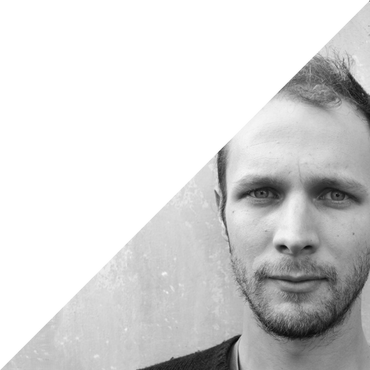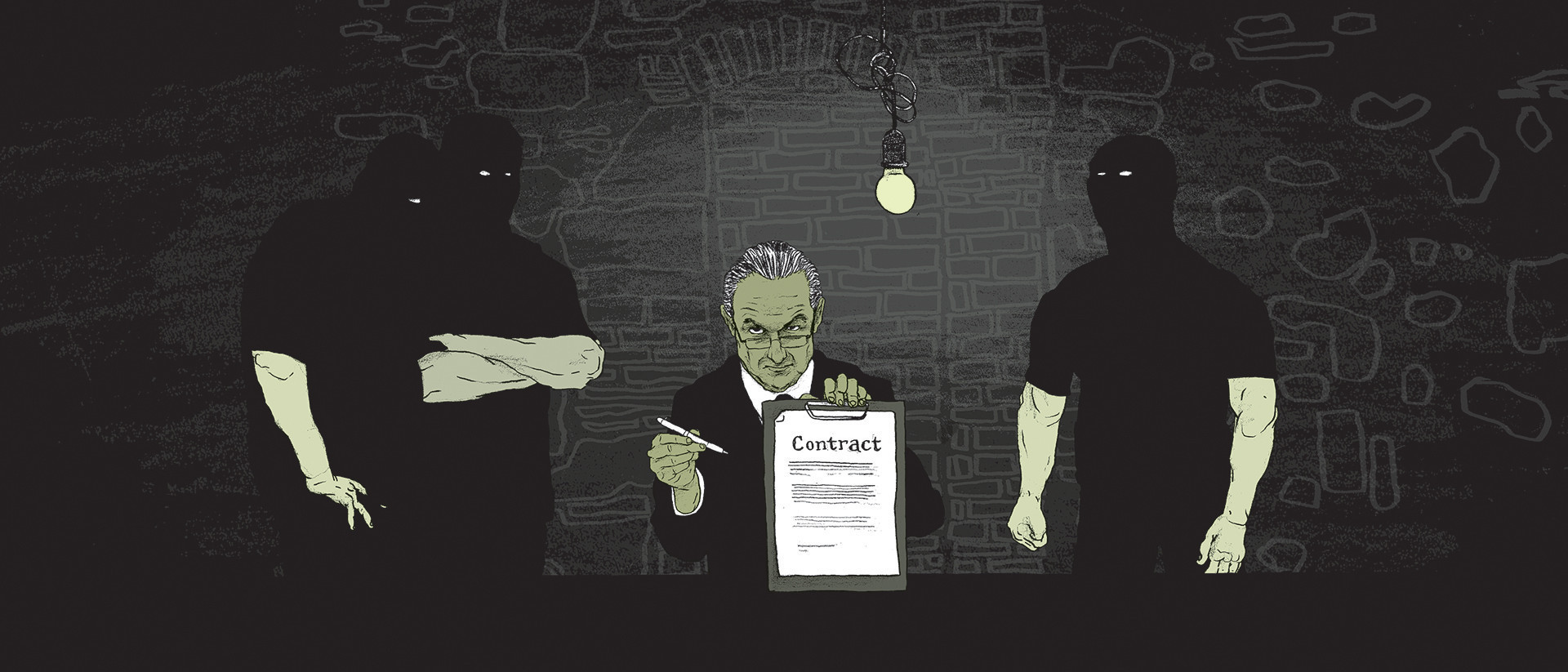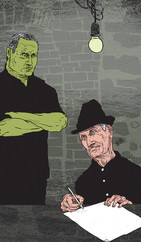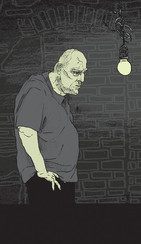At the edge of the village of Dobromir, where the dirt road gives way to vast plains of crops that stretch, unbroken by trees, all the way to the Black Sea, fifteen women are talking to me at once. Some are clutching ragged bits of paper and pushing them in my direction, others have their identity cards out as a hedge against incredulity.
"They came like bandits in the middle of the night and forced us out of our homes," says Andrea Coman, a weathered looking woman of about fifty-five, dressed in a once yellow tracksuit that now matches the dusty colour of the road where she stands.
"A gang of local thugs herded us into a van with a group of other older villagers and took us to a block of flats in Constanta [the nearest large city, LDH]. It was dark in the building and they pushed us like animals into a room where there was a notary waiting. They made us sign something but we couldn’t see what we were signing. They put cash in our hands but we didn’t know how much, and then pushed us out and back onto the bus. We only got to count the money once we got home."
This is how Coman parted with her farmland in 2006. When she got back home she counted the money; it came to 400 lei (about €90) for a hectare of land. Six years later, a subsidiary of the Rabobank bought Coman’s land for upwards of €2000.
How it works
Since 2012, Rabobank has bought at least 939 hectares of land in Dobromir. the vast majority of which they lease out to the village mayor, Eugen Iliescu. In the plains of eastern Romania on which Dobromir lies, the bank has purchased another 17,000 hectares. Through a farmland investment fund called Rabo Farm, the Rabobank has invested €315 million in farmland, with the intention of selling after 10-15 years at a profit of up to €900 million.
Infographic by Momkai
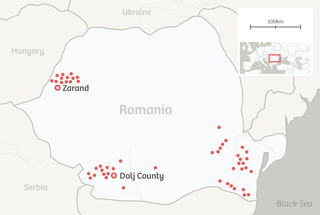
In my previous piece I described how land grabbing in this part of Europe actually works. The example of Dobromir shows in more detail why eastern Romania, where the Danube river leaks its nutrients into the surrounding earth, is the part of Europe Rabo Farm has returned to most often.
The reasons are simple. First, there’s the soil. Heavy in humus and a deep black colour, it is known as chernozem – or black earth – and is so prized for its fertility that in Ukraine, where the law prevents foreigners from buying land, each year $900 million worth of it are shovelled into trucks and illegally trafficked across the border.
Second, there’s the price. Currently valued at between €2000 and €3500 per hectare for foreign investors, agricultural land here is a fraction of the price of land in western Europe, and is expected to triple in value over the next decade.
Why sell your land?
Not that this means much to the villagers of Dobromir. The village, Mayor Iliescu tells me, is the poorest in Constanta County – which would put it in line for the poorest in all of Romania. Some 70% of residents depend almost entirely on public assistance, which at a mere €50 a month they then often supplement with food grown on small plots of land and money sent back by family members living abroad.
Villagers tell me how they sold their land to pay for a wedding or support a sick relative
So when a demand for land started to grow in the years running up to Romania’s accession to the European Union in 2007, many villagers were keen to sell. Often they needed the money for something immediate – villagers I talked to tell me how they sold their land to pay for a wedding, to travel abroad to work, or to support a sick relative.
But few wanted to sell their land in the way that was forced upon them. Through dozens of interviews and the analysis of hundreds of land registry documents, we have found that almost all the land Rabobank bought in Dobromir and the neighbouring villages was acquired by a group of three intermediaries. These intermediaries, in turn, employed a group of local heavyweights to gather the land, led by a certain Gheorghe Papuc.
The story everyone is telling
Papuc’s name is on everyone’s lips in Dobromir. They know him as a close associate of the former mayor of the village, Iusein Visel, who was voted out of office in 2012.
Illustration by Gijs Kast for The Correspondent
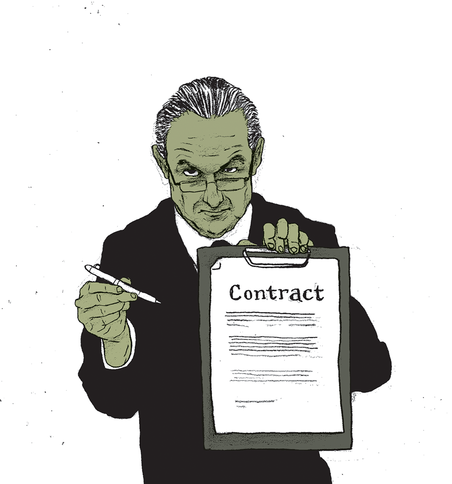
Last year, an investigation was launched into the two of them by the National Anti-Corruption Directorate on charges that they had worked together to steal over €200,000 in agricultural subsidies from the state. And they know him as a scout, gathering land for what the villagers refer to again and again as a ‘mafia’.
Ramona Constantin is a pensioner who sold five hectares of land to Papuc, after her uncle died and left her the land. Documents seen by De Correspondent suggest that part of this land was then sold on to Rabo Farm.
"[Papuc] and his men got names from Visel of all the older people who have land. Then they targeted us," says Constantin. "They stood outside our doors at night and shouted for us, for hours if necessary, until we came out."
After this, her story mirrors that of Coman and many other villagers I speak to: all were taken by bus to Constanta to meet the notary, where they signed papers in the dark and were handed a bundle of notes in return – never worth more than €100 per hectare. No one I speak to knows who their land was sold to.
Who is this Gheorghe Papuc?
Papuc’s name is nowhere to be found on any land registry documents relating to Rabobank. The documents show that the bank’s subsidiary Kamparo Investment bought land in Dobromir and surrounding villages from three intermediaries: Stefan Babos Parcalab, Gabriel Ovidiu Stefanescu, and Marius Octav Moronescu.
Our evidence suggests that Kamparo had an exclusivity contract with these intermediaries, ensuring that in this area Kamparo would buy only from them or companies they worked with.
When we asked Dick van den Oever, Managing Director of Rabo Farm, if this was the case, he said: "I do not know by heart what kind of agreement we have with specific intermediaries, but in principle I would say that if I had an agreement with someone who is acting in an area, I would prefer to work with him on an exclusivity basis."
If we are to believe the land registry documents, Babos, Stefanescu, and Moronescu bought the land they sold to Kamparo directly from villagers, starting in 2005 and continuing through to 2014. But these documents don’t tell the whole story.
Paying a visit to Papuc
Situated behind a makeshift chicken wire fence on the side of a busy road, Papuc’s office doesn’t look like the workplace of a mafia man. A cardboard sign on the gate advertises firewood for sale. Inside, a shabby bungalow looks like it was built in a hurry. As I approach, a heavyset man hurries out the door and up to the gate, where he introduces himself as ‘the guard’. Shortly after, Papuc arrives with his wife.
"They ripped me off," he says. "Then I couldn’t pay my men, so they turned against me."
Built like a boxer and with a twitch that intermittently interrupts his speech, Papuc is happy to talk about his business. He explains how he has worked extensively for Stefanescu, Babos, and Moronescu over the years, putting together a team of scouts to gather them a total of 1700 hectares of land in Dobromir and the surrounding villages.
For this, he was promised payment of 400 lei (about €90) a hectare – the same amount villagers in Dobromir report being paid for the land itself. But Papuc says he was never paid the full amount. "They ripped me off," he says. "Then I couldn’t pay my men, so they turned against me."
Following the paper trail
Land registry documents show that Kamparo Investment also bought hundreds of hectares in Dobromir and surrounding villages from a company called Retail Development Services, who also used Stefanescu, Babos, and Moronescu as exclusive intermediaries. Retail Development Services held the land for three to five years before selling to Kamparo Investments.
Business registry documents show that Retail Development Services has gone to great lengths to conceal its owners. The company’s sole shareholder is listed as Spalato Company Ltd, which is registered to a postal address in Cyprus. Spalato in turn is owned by Vane Investment Corp and Tegor Holdings, which are registered in Liberia – one of seven countries worldwide blacklisted by the Organisation for Economic Co-operation and Development (OECD) as ‘uncooperative tax havens’.
What happens if you follow the money?
Illustration by Gijs Kast for The Correspondent
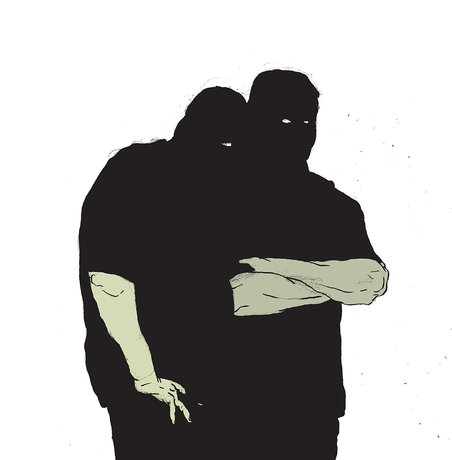
With the help of the Thomson Reuters Foundation, we got in touch with leading Liberian investigative journalist Rodney Sieh and asked him to try and find out who was behind Vane Investment Corp and Tegor Holdings. The companies, he found, had been set up by a lawyer and acted as shells, with all funds channelled offshore once again, to an unnamed tax jurisdiction. No names – not even that of the lawyer – were listed in association with the companies.
But Romanian land registry documents give one important name as a representative of Retail Development Services – Menachem Metzger. Metzger is an Israeli businessman who court records show to have a long history of illegal land deals behind him. Our research suggests he first appeared in Romania in 2003, just months after he had run into trouble in Israel for filing for bankruptcy with over €3 million of unpaid debts, causing the Israeli Authorities to confiscate his assets and freeze his passport.
Now, his name can be found as administrator of a number of Romanian companies, worth a combined total of over half a billion euros. All but one of these companies are registered at a single P.O. Box in Cyprus and at least one has reportedly come under investigation by the National Anti-Corruption Service in Romania on suspicion of money laundering.
The mayor who wanted to steer clear of corruption
Since becoming mayor of Dobromir three years ago, Eugen Iliescu has made friends and enemies in equal measure. Many people here say that he has begun to free the village from the mafia that had formed around the former mayor, Visel. An old man named Petrica Oriviceanu tells me how Iliescu helped him get his land back after it was illegally taken and sold to Kamparo Investment in 2012. Iliescu found out what had happened, informed Oriviceanu and then paid for a lawyer to take Kamparo and the other parties involved to court. In a matter of weeks Oriviceanu had his land back.
But others are less certain. Iliescu now controls almost everything in Dobromir – including 882 hectares of the land owned by Rabo Farm. On top of this, he farms another 2300 hectares. He tells me how everything he produces he sells to Cargill, the American agricultural giant, who sells it on: "Wheat to Egypt, rapeseed to Holland and barley to the United Arab Emirates."
We meet, at his request, in a neighbouring village, at a small, badly lit bar. Apart from a young woman playing on her phone behind the bar, it is completely empty, and remains so for the full two hours I am there.
"Even Stefanescu and Babos make sure they kept their collars white – they employed Papuc to acquire the land for them and kept their heads turned while he was doing it."
I ask him why Kamparo Investment bought through intermediaries, rather than sending their own people to Dobromir. "They didn’t have time to run around after documents, to look for sellers and deal with all the hassle," he says. "They had guys who did all this for them, and it suited Kamparo as it was easier. And it meant they were always clean. Even Stefanescu and Babos make sure they kept their collars white – they employed Papuc to acquire the land for them and kept their heads turned while he was doing it."
We put the complaints of Dobromir villagers to Rabobank. They responded: "The due diligence process for land acquisitions foresees a check on sellers and intermediaries. These processes have led in a number of cases to the cancellation of cooperation with intermediaries. We take the allegations seriously. We will use any new information to review our business relationships and terminate should your allegations prove to be correct."
For the moment, Rabobank’s intermediaries are still hard at work in Dobromir. When I last visited the village this summer, Mayor Iliescu told me that Stefanescu and his lawyer had been there that week, "with a briefcase full of money," signing new ownership papers for land obtained by Papuc and his men.
What this says about Romania
Illustration by Gijs Kast for The Correspondent
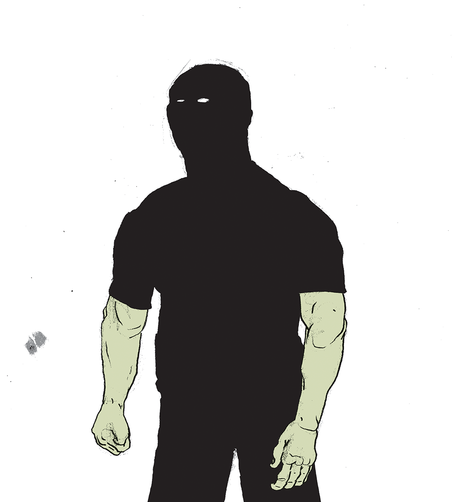
Before I leave the village, a young woman who has lived and worked in Dobromir all her adult life – and who wishes to remain anonymous – walks me up to Iliescu’s farm complex. Built on the site of the old collective farm, it now looks shiny and efficient. Brand new John Deere tractors sit outside vast corrugated steel warehouses, while a sole figure shifts hay bales with a fork lift. It could well be in France, or Holland for that matter.
"Iliescu has created a presentable image with this, but it’s built on our backs," she says. "Since the time when Romania became part of the European Union, almost all the villagers here have sold their land or had it taken from them. Now they regret it terribly. They have nothing to their name. It means they can be bought for almost nothing by anyone who wants to be mayor. It is a pity, but this is how our local politicians understood democracy."
The following – and many more – helped make this article happen: Milvus Wildlife Protection Group, Attila Szocs, Stefan Candea, Andreea Pavel, Manuela Boghian, and Elena from Dobromir.
This investigative journalism project was made possible in part by the Robert Bosch Stiftung and JournalismFund.eu



